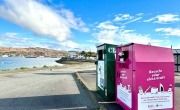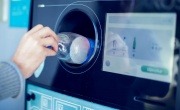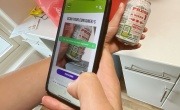Compostable cups can now be composted in windrow facilities
The Renewable Energy Association (REA)’s Organics Recycling Group has announced that garden waste composting facilities across the UK are now able to process certified compostable hot and cold cups and lids.
The announcement was made following talks with the Animal and Plant Health Agency, Environment Agency and Scottish Environment Protection Agency, and was facilitated by Edinburgh-based Vegware, a specialist in plant-based compostable foodservice packaging.
Some recycling companies are taking steps to tackle the issue of recycling standard disposable hot cups, a process made difficult by the mixture of cardboard with a plastic lining, along with the liquid contamination. In May this year, bespoke paper manufacturer James Cropper announced a ‘CupCycling’ process, which the company says enables it to separate the plastic and paper and use the fibre to make luxury recycled products, while the plastic lining is processed at a separate facility. However, there are currently only five (soon to be six) facilities able to process standard plastic-lined cups.

As there are over 100 open windrow composting facilities across the UK, this latest announcement significantly increases the number of facilities allowed to process compostable drinks waste. It adds to the existing 53 in-vessel composting (IVC) facilities licensed to process food waste, over a third of which already accept Vegware’s compostable packaging.
In the UK, food waste is only allowed to be processed at in-vessel composting or anaerobic digestion facilities. These processes reach 60-70 degrees Celsius, killing any pathogens that may be present from meat or bones. These animal by-product regulations (ABPR) came into force after the UK’s foot-and-mouth disease outbreak, to ensure that the resulting fertiliser is safe to be spread on fields.
Open windrow composting takes in garden waste from local authorities and businesses and has not been suitable for processing animal by-products before now. Products can now be composted in windrow facilities if milk or cream fit for human consumption is the only animal by-product present, and the packaging holds a valid compostability certificate from an independent certification body. The announcement does not apply for compostable waste material transported from outside the EU.
The Environmental team at Vegware has worked closely with the waste sector since 2012, increasing clients’ access to commercial composting and helping foodservice clients reduce contamination.
Group Recycling Consultant Eilidh Brunton commented: “In the US, Vegware is composted in open windrow facilities, and the Isle of Man’s DEFA [Department of Environment, Food and Agriculture] has recently approved Vegware’s compostable drinks-only waste for open windrow. We took this idea to the Organics Recycling Group, who explored the detail with the government agencies. We are delighted to have official approval, as this opens up new opportunities for Vegware’s hot cups, cold cups, lids and stirrers all to be composted together with garden waste here in the UK.
“We already have sites keen to start a trial, and now we have the green light to start working through our due diligence process with these facilities. We expect that soon, UK householders and businesses in many regions will be able to put our compostable cups and lids in their garden waste bins.”
Vegware’s CEO Joe Frankel added: “This is a game changer for compostables. With government approval for over 100 new composting facilities, we have expanded composting opportunities for our numerous clients who only serve drinks. This complements our existing relationships with in-vessel composting facilities and some anaerobic digestion facilities who accept our full range together with food waste. We’re growing the UK’s circular economy – disposables made from plants, composted here in the UK, creating compost to feed British fields.”
Jeremy Jacobs, Technical Director, Renewable Energy Association, said: “We welcome this opportunity for composting facilities without APHA [Animal and Plant Health Agency] approval to biodegrade these particular materials. Every year 300 million tonnes of new plastic are produced, so ensuring as much as possible is recycled and reused is an urgent and critical issue if we want to tackle plastic pollution in our soils, rivers and seas. Many plastics are durable and can take 600 years to break down. Avoiding plastic through the use of compostable packaging where possible is clearly to be welcomed.
“We have worked closely with Vegware to bring about this change; their willingness to collaborate closely with the waste sector on compostability issues makes them an exemplar organisation in partnership working.”
Increasing access to composting facilities
Commercial composting collections are not currently available in all UK regions, but companies such as Vegware are increasing coverage. Numerous waste collectors across the UK have an existing collection route taking used Vegware for composting with food waste, and Vegware has recently launched its own collection, Close the Loop, in order to help more clients gain access to commercial composting, This service is currently running in Scotland, Bristol, Gloucester and Worcester, with further expansion being developed.
Vegware’s Environmental team also offer composting clients support to minimise contamination in order to avoid sending contaminated waste to composting facilities. Support includes bespoke bin signage, staff training and a range of communications tools to encourage correct recycling. As part of its commitment to producer responsibility, Vegware is also phasing in a new Green Leaf band design to its range as a clear visual cue for compostability.
Progress is being made in the area of compostable coffee cups, and universities, large office blocks and festivals have become environments in which compostable cups and food packaging are widely used as it is easier to ensure that waste reaches a suitable bin, from which the waste can be taken to a suitable composting plant. In the major takeaway drinks chains, which do not operate in such a closed environment, it is not currently possible to ensure that used items would end reach are a suitable end destination, therefore many are trying to encourage customers to use reusable cups. Following a three-month trial in London, Starbucks has brought into force a five pence paper cup charge across all 950 stores in Britain. Those using reusable cups have already received a 25 pence discount off any Starbucks drink for several years, with other coffee chains such as Pret A Manger and Costa offering similar deals.







